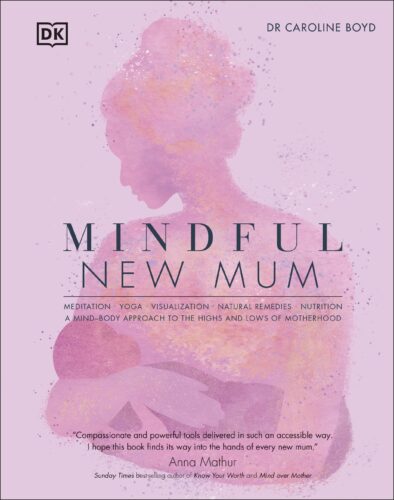Swimwear 2024
After a very damp couple of months, most of us are really looking forward to our sunshine break with May half term and the Summer ... Read Feature

Author Dr Caroline Boyd has very kindly given us three copies of Mindful New Mum to giveaway.
By Dr Caroline Boyd, perinatal clinical psychologist & author of Mindful New Mum
“What if I drop my baby? What if my baby stops breathing? What if I throw my baby off the balcony?”
Unwanted, intrusive worries of harm coming to our baby are really common – especially in early motherhood when our threat system is on high alert.
These attention-grabbing, anxiety-driven thoughts include word thoughts (such as “What if my baby stops breathing?”), vivid images (e.g. a mental picture of the baby rolling off the changing mat), and impulses or urges (a sudden impulse to throw the baby). Broadly, there are two categories of unwanted, infant-related harm thoughts.
One is accidentally harming a child, reported by nearly every single woman in my study and larger studies. Examples include an image of the baby suffocating, or falling or being dropped.
The second type are thoughts of intentional harm – reported by 1 in 2 women. Examples of intentional harm thoughts include screaming at the baby, or impulses to shake or throw the baby. These harm thoughts can pop into a mother’s mind unexpectedly and evoke horror – even though she would never deliberately hurt her baby.
Women often feel intense shame, guilt or horror when they have these thoughts – which means they don’t talk about them. Shame keeps us from sharing our thoughts which can be experienced as frightening and paralysing. The very fact mums feel ashamed or horrified about having these thoughts is a strong sign that they’re not going to hurt the baby. These thoughts tend not to sit comfortably with the woman – meaning that they’re not indicative of risk in themselves. Brand new research (Fairbrother et al, 2022) shows that experiencing these unwanted thoughts makes you no more likely to deliberately hurt your baby than any other parent.
Why else don’t mums talk about their thoughts?
Many women believe their unwanted thoughts are a sign that they’re a ‘bad’ mum. It’s the meaning that mothers draw from their thoughts and visions that gives them power. None of the women I interviewed in my published study shared their harm thoughts with a health professional, due to fears of being judged an unfit mother or having their baby taken away. This is what I call the policing effect of aspiring to be “Supermum”. It relates to Western-centric myths of motherhood – the Supermum myth – promoting the idealised mother as ‘natural’, blissed-out and forever fulfilled. This toxic myth gets internalised, leading to mums believing that they must prove to themselves and others that they’re always calm, coping and in control. Of course, when we experience the messy reality of having a baby, we discover how living up to this ideal is impossible, and it sets women up to fail.
Dr Boyd’s tips for coping:

Author Dr Caroline Boyd has very kindly given us three copies of Mindful New Mum to giveaway.
After a very damp couple of months, most of us are really looking forward to our sunshine break with May half term and the Summer ... Read Feature
Packing 4 or 5 weeks’ worth of lessons into 4 or 5 days at an intensive swimming course can make all the difference to a scared toddler, a nervous 3 ... Read Feature
Hi there - I’m Holly Mason, founder of The Skin Investment Clinic. I struggled with acne from a teenager and throughout my 20s. I ... Read Feature